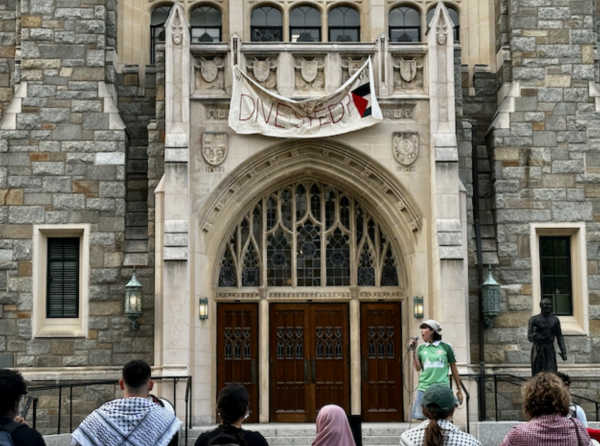After Georgetown University refused to implement a student referendum calling on the university to divest from companies associated with the Israeli military, around 60 Georgetown community members protested the decision and demanded divestment at a May 1 rally.
Though over two-thirds of students who voted supported the nonbinding Georgetown University Student Association (GUSA) referendum, interim university President Robert M. Groves announced the university would not implement the referendum’s calls less than an hour after GUSA announced its passage. The rally — organized by Georgetown’s chapter of Students for Justice in Palestine (SJP) — saw demonstrators gather at Healy Hall before marching to White-Gravenor Hall to unfurl a banner criticizing the university’s choice not to divest.
An SJP media liaison said divestment advocates will continue to protest until the university divests.
“What the rally is really doing today is calling the university out and saying, ‘We actually did take a formal vote, and we did gather as many opinions as we could, and the majority of those people said that they would like divestment,’ and the university shut that down,” the media liaison told The Hoya. “It really speaks to its lack of willingness to reflect its students’ beliefs and values.”

The nonbinding referendum asked undergraduate students if they supported the university disclosing its private investments, divesting from private companies with ties to the Israeli military — such as Amazon and Alphabet, the parent company of Google — and ending partnerships with Israeli academic institutions. After the April 26-28 voting period, the referendum passed with 67.9% of the vote — 1,447 students voting in favor, and 685 against — with a turnout of 2,132 students, or 29.5% of the student body.
In the emailed announcement, Groves said student referendums are not binding and divestment would run against Georgetown’s values.
“At Georgetown, a student referendum provides a sense of the student body’s views on an issue. Student referenda, however, do not create university policy and are not binding on the university,” Groves wrote. “Georgetown will not implement this referendum, based on our institutional values and history and existing university resources and processes that address our investments.”
Fiona Naughton (SFS ’26), who attended the rally, said it aimed to empower students demanding the university divest from Israel.
“We’re demanding that the university listens to its students, who are the ones who give the university its power and its purchase,” Naughton told The Hoya.
Lela Tolajian (SFS ’26), another rally attendee, said the university’s quick response to the referendum’s results displays student activists’ power to confront the university.
“The fact that the university had that ready shows that student organizing is having an effect on them, and they are being pushed to confront the fact that they are going against every single one of their values by continuing to invest in the ongoing genocide in Palestine,” Tolajian told The Hoya. “The university has a moral, ethical responsibility to divest, and the longer they stay invested, the worse it looks for Georgetown.”
At the rally, protestors connected their advocacy to a tradition of anti-war protests, including the “May Day” protests 54 years earlier in 1971, where the Metropolitan Police Department (MPD) assaulted thousands of students demonstrating against the Vietnam War, and the monthslong movement successfully encouraging the university to divest from South African apartheid in 1986.
In their chants, the demonstrators at the rally said Georgetown was complicit in the Israel-Hamas war through its investments in companies tied to Israel’s military.
“Georgetown, Georgetown, we know you, you are funding genocide too,” the demonstrators chanted. “Georgetown, do you hear us now? We demand divestment now.”
“This campus is a freedom zone,” the demonstrators added. “Gaza, you are not alone.”
In his announcement, Groves said the university is committed to the “ethical management of the University’s endowment,” citing Georgetown’s Socially Responsible Investing Policy, which aligns the university’s investment strategy with its commitment to social justice.
Naughton said paying tuition grants students the right to influence the university’s investment policies.
“As students, we have the fundamental right and responsibility to dictate where our money is going and what our university is investing in, and that’s why we’re here,” Naughton said. “Students have held Georgetown responsible for implementing its Jesuit values since Georgetown’s inception.”
Tolajian said Georgetown community members have a responsibility to call for divestment.
“We have a responsibility to pay attention to what the university is doing,” Tolajian said. “When we come to this school, the first thing we’re told is about these Jesuit values, about being a force of good within the world, and we have a responsibility to use our education to stand up for what’s right.”